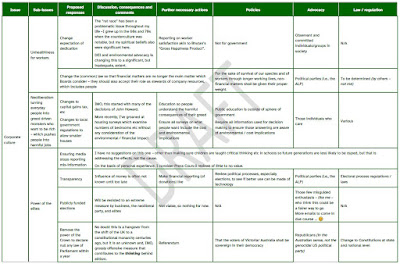***
I was going to send this on my last day in engineering, but have decided to send it now. I may change it over the next few months, in which case I will send an updated version.
I have effectively taken early retirement - on the basis of advice from my doctor, so this was nominally driven by health issues. However, after nearly half a century, I had had enough of the corporate life.
The main reasons for my leaving are:
·
the extremely high and, over a period of increasing years or even decades of work life, probably unsustainable workload across the entire
profession - no company in the engineering and construction world is significantly
better or worse, in my experience, on this aspect.
The widespread nature of the problem is
evidenced, in my opinion (IMO), by
(a) a friend who has been trying to get me to join a particular semi-government
organisation for the last two decades recently admitting that workloads there
had increased as well, and
(b) people returning to companies they had left – presumably after they found
the grass is not greener on the other side.
The engineering profession is aware of this, and is seeking to do whatever it
can (find and attract new employees, send work to overseas design centres,
hire short term staff, etc) to address the issue;
· the conservatism of many I’ve encountered since I began in the corporate engineering world – which is being changed for the better in the last decade and a half, but is still a problem as evidenced, IMO, by the preceding point and the continuing struggle to achieve diversity, equity, and inclusion (DEI);
· the engineering registration scheme, which added a THIRD set of CPD (continuing professional development) and audit requirements, thereby exacerbating the unsustainability of the profession’s workload – especially for people with caring responsibilities.
I will probably have to find some part time work – or maybe set up a small hobby business in the diversity, equity, and inclusion (DEI) field.
For most of my life, the corporate world (not just the engineering profession) has involved competition - the problems of which have been shown by the Misconduct in the Banking, Superannuation and Financial Services Industry Royal Commission … and the Chernobyl accident.
That all needs to change – apart from anything else, because young people now will, as a general trend, live and work longer than any other human who has ever existed, and the current pace of and intensity of work is NOT sustainable over more years or decades. I mentioned this in my retirement speech at work (see here), and I also note (here, on The Guardian website) Federal Treasurer Jim Chalmers' comments regarding our ageing population, and the articles on the planet-wide consequences of this here (The Guardian), and this, on the four day week (also from The Guardian).
We, as a society, IMO need to also teach people – at the BEGINNING of their careers - to plan to start progressively cutting their hours back from their late 50s/early 60s, and to not so willingly agree to every request form overtime or an accelerated programme.
We also need – again, as a society, IMO to:
· make sure there are no insurance or other obstacles to people working at older ages – including the government stepping in and providing insurance, if necessary;
·
ensure there is a greater appreciation (to
the extent of getting paid for it) of experience and what are mischaracterised as
“soft skills” – and that people can continue to contribute those when older.
In my case, I have been declining to be available for discussions on any engineering
matters as I will be making my registration inactive and I will not be continuing CPD
activities.
I will, however, be providing my DEI skills through my hobby
business;
· teach people to plan for changes in career, and aid them in doing so – and the Andrews Government aid to people seeking work is an excellent start on this, but the new work order series of publications of the Foundation for Young Australians (FYA) also applies here – and needs to be used in school jobs counselling, if it is not already;
·
act on the lessons shown by the pandemic
lockdowns: the economy should serve people in ways that are equitable,
work-life balance needs to be improved, four day weeks are viable and may give
better productivity (and productivity does NOT
equal corporate profits), and we need to make working at home easier.
This also needs to include changes to corporate culture – such as this,
from The Guardian, and ways to counter the power of the “1% of the 1%” –
the extreme elites of society (which would include teaching critical
thinking [such as this
free online course by Brendan Myer] and morals based on the
Universal Declaration of Human Rights in schools, improving mainstream media so
it no longer pushes misinformation, and things like publicly funded elections
so billionaires and business cannot skew outcomes).
I am aware that psychosocial safety is being introduced: that needs to include these points, but they also need to be addressed elsewhere, which I will address in the table (copied as a series of images - which rendered the links inactive: my apologies).
I am also aware that, as I mentioned above, some of this is beyond what can or should be addressed by governance. Nevertheless, good policy leads to good law, although good policy is also set by good advocacy. The table sets out my views on how the points I am discussing could possibly be realised.
If you appreciated this post, please consider promoting it - there are some links below.
Vote Yes for the Voice in Australia.
Finally, remember: we need to be more human being rather than human doing.



No comments:
Post a Comment
Note: only a member of this blog may post a comment.